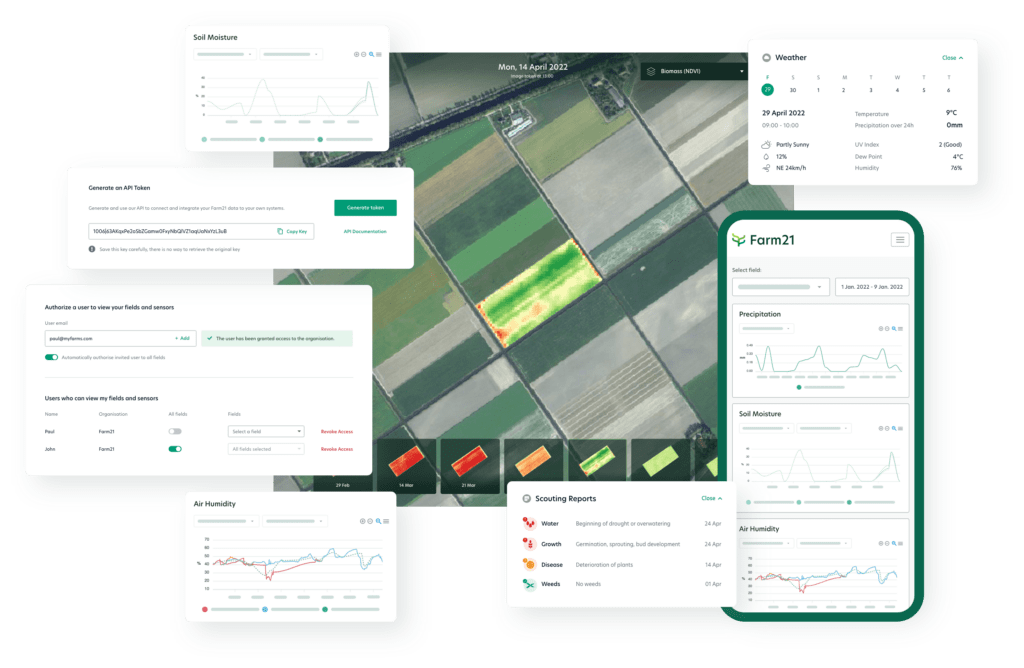Manage your business more efficiently than ever before with the right farm dashboard.
Keeping tabs on the complex work of running a farm is no easy task, but with a tailored farm dashboard, you can easily monitor your agricultural business and make informed decisions about irrigation, fertilising, pest control and much more.
Better data drives better decisions.
Precision farming utilises technology to collect an analyse data to increase efficiency and productivity. One key tool in this approach is the farm dashboard. A farm dashboard is a digital platform that allows you to collect, analyse, and visualise data from various sources, including weather sensors, soil sensors and satellite imagery and well as scouting reports on one central hub.
This data can then be used to make informed decisions about planting, harvesting, and the general day-to-day management of your farming operation. It inevitably leads to cost, labour and resource savings. In this article, we will explore the value of precision farming and data-driven decisions, and how a farm dashboard can help you achieve achieve your goals.
What is the value of precision farming and data-driven decisions?
First let’s delve into precision farming and its benefits. Precision farming is a technology-driven approach to agriculture that allows growers and crop advisors to optimise crop production by collecting and analysing data from various sources. This data can be used to make decisions about planting, harvesting, and managing the farm, with the goal of increasing efficiency, productivity, and profitability.
One of the key benefits of precision farming and data-driven decisions is the ability to use resources more efficiently. By collecting data on factors like weather, soil conditions, and crop growth, growers can make more informed decisions about when and how much to irrigate and fertilise, when to plant and when to harvest. This can lead to more targeted use of resources, and ultimately, better increased profitability.
In addition, precision farming can help farmers to better manage disease and pests. By collecting data on weather, soil conditions, and crop growth, farmers can identify patterns that may indicate the presence of disease or pests. This allows them to take action quickly, preventing the spread of disease and reducing the impact of pests. (Read more about how to go from reactive to proactive farming here)
What are the key features of an efficient and effective farm dashboard?
In essence, a smart farm dashboard is a digital platform that allows farmers to collect, analyse, and visualise data from various sources. This data can then be used to make informed decisions about planting, harvesting, and managing the farm. Farm dashboards typically incorporate data from various sources, such as weather sensors, soil sensors, and GPS-enabled equipment. This data is collected and analysed in real-time. To get the most out of a farm dashboard, look for one which includes the following features:
Real-time data
A farm dashboard should provide real-time data on key metrics such as weather, soil moisture, and crop health, as well as data on inputs such as irrigation, fertilisation, and pest control. This enables growers to have a comprehensive and up-to-date understanding of their operations, enabling them to make informed decisions, optimise resource usage, and enhance crop performance, leading to more efficient and profitable farming practices. Real-time data can help farmers grow more efficiently by:
- Improving resource management: Real-time data on resource usage, such as water, fertilisers, and other inputs, can help farmers optimise their usage, reducing waste and saving on costs.
- Enhancing decision-making: Real-time data provides farmers with up-to-date information about their crops, soil, and the environment, enabling them to make informed decisions about planting, irrigation, fertilisation, and pest management.
- Early detection of issues: With real-time monitoring and data analysis, farmers can quickly detect issues such as pest infestations, disease outbreaks, and soil moisture imbalances, allowing them to take prompt action to address these issues and minimise their impact.
- Improving crop performance: Real-time data on crop performance, including yields, growth patterns, and pest and disease issues, can provide valuable insights into the strengths and weaknesses of different crops, allowing growers to make informed decisions about what to plant and how to manage their fields.
- Better monitoring and evaluation: Real-time data can be used to monitor the progress of crops and evaluate the effectiveness of new agronomic practices, technologies, and other interventions, allowing farmers to make more informed decisions about their operations.
Easy-to-use interface
The value of a simplified farm dashboard cannot be overestimated. Precision farming tools should save time, not add to the to-do list. That’s why the dashboard should be user-friendly and intuitive, with clear visualisations and easy-to-read graphs and charts. A simple farm dashboard can offer several advantages for farmers, including:
- Ease of Use: A simple dashboard is easier to use and understand, allowing farmers to quickly access the data they need without being overwhelmed by complicated interfaces or excessive information.
- Improved decision-making: With clear, real-time data at their fingertips, farmers can make informed decisions about their operations, including irrigation, fertilisation, and pest control, leading to improved yields and reduced waste.
- Better collaboration: A simple farm dashboard can improve collaboration between team members, as everyone can access the same data and communicate more effectively.
- Accessibility: With a simple farm dashboard, farmers can access data from anywhere, at any time, through a mobile device, improving decision-making and allowing for real-time updates and adjustments.
Customisable options
The dashboard should allow farmers to customise the data displayed, including the ability to set alerts for critical data points. By allowing farmers to personalise their dashboard, a customisable farm dashboard gives growers quick access to insights most important to them. They can decide what information they want to see, so that they can get the most value without wasting time.
- Tailored experience: A customisable dashboard allows farmers to personalise the data and information displayed, making it easier for them to access the specific data they need to make informed decisions.
- Improved efficiency: With the ability to customise the dashboard, farmers can streamline their data collection and management processes, saving time and increasing efficiency.
- Better data visualisation: By customising the dashboard, farmers can visualise their data in a way that makes the most sense for their operations, leading to improved decision-making and greater insights into their farm’s performance.
- Increased flexibility: With a customisable dashboard, farmers can adjust their data and information as their operations change, providing them with the flexibility they need to grow and evolve their farm.
Historical data
A good farm dashboard should also provide historical data for comparison and analysis. By using historical data, growers can gain a deeper understanding of their operations and the environment, spotting patterns and trends, and keeping record of the results achieved by certain actions.
- Trend analysis: Historical data can provide valuable insights into patterns and trends over time, allowing growers to make informed decisions about future operations and management.
- Benchmarking: Historical data can be used as a benchmark for comparing and evaluating current performance, helping growers to identify areas for improvement and make changes that drive better outcomes.
- Weather patterns: Historical data can help growers understand weather patterns and how they may affect future crops, allowing them to make decisions about planting, irrigation, and other processes that are best suited to the conditions.
- Soil analysis: Historical data on soil conditions, including soil moisture and nutrient levels, can provide valuable insights into the health of the soil and inform decisions about fertilisation and other processes that impact soil quality.
- Crop performance: Historical data on crop performance, including yields, growth patterns, and pest and disease issues, can provide valuable insights into the strengths and weaknesses of different crops, allowing growers to make informed decisions about what to plant and how to manage their fields.

Introducing Farm21’s Data Platform
By choosing Farm21’s platform, you can access a comprehensive, integrated, and customisable farm dashboard that is designed specifically for precision farming and soil moisture monitoring. It provides all the tools and data needed to make informed decisions and grow an operation more sustainably. Farm21’s data platform is free, and easy to navigate with information from multiple sources including soil sensors, satellites, weather and scouting.
How can you choose the best farm dashboard?
Growers, crop advisors and researchers can choose the best farm dashboard by, firstly, considering their specific needs. This might require some research into which features different platforms offer and it matches with the operational needs of the business. The second consideration is, without a doubt, user-friendliness. A good farm dashboard should be easy to use and understand, with a clear and intuitive interface.
Thirdly, in order to choose the best solution, potential users should consider customisation options: A customisable dashboard can provide greater flexibility and improved data management, so it’s important to choose a dashboard that offers customisation options. Additionally, it is important to consider the cost of the dashboard and determine whether it is within the budget and provides value for the cost. Lastly, but also very important customer support. Efficient customer support can be crucial in case users run into any issues or need assistance, so it’s important to choose a dashboard that offers reliable and responsive customer support.

Farm dashboards are revolutionising the way we manage farming operations. By providing real-time data and analytics, you can make informed decisions, increase efficiency, and maximise yields.
Whether you’re a small family farm or a large commercial operation, a farm dashboard can help you stay ahead of the competition and achieve your goals.
